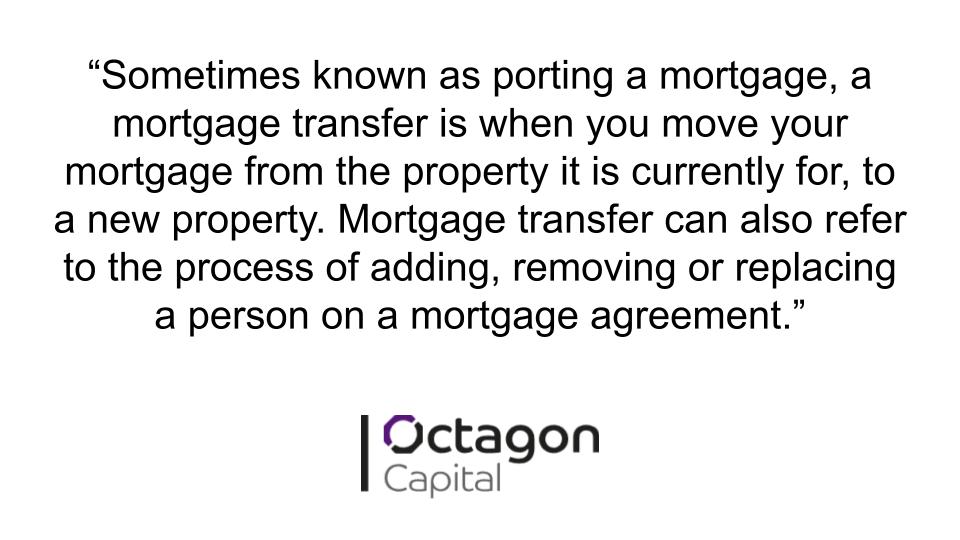Moving house can be stressful in itself, but even more so if you aren’t sure what will happen to your mortgage. Many people aren’t aware of the various different options they have when it comes to moving house when you have a mortgage, assuming that the only option they have is to pay it off in full.
This Octagon Capital blog runs through your options when it comes to moving house with a mortgage and how you can decide which to choose.
Moving house with a mortgage
When trying to move house with a mortgage, it’s important to be clear about your options and how each might impact your finances. It’s essential to consider all of the options available to you and to only borrow an amount of money that you will be able to pay back at the scheduled times.
On top of this, there might be exit fees for leaving your current mortgage deal which should definitely be considered for each option available to you.
1. Transfer your mortgage
Sometimes known as porting your mortgage, transferring your mortgage is a way to switch your mortgage to your new property instead of your current one. This also can refer to when someone is added, removed or replaced from a mortgage agreement.
When moving house, the likelihood is you are looking to do a straight transfer of the property listed on the mortgage agreement. Some people do struggle to transfer their mortgage if they no longer pass the necessary affordability checks. However, if you are still able to comfortably afford the mortgage repayments, have good credit and have a good track record of paying on time, then you should be able to transfer your mortgage from one property to another.
2. Borrow more funds
Another option that people have when it comes to their mortgage and moving house is to secure more funds. This is a good option when the home you are moving to is more expensive than your current property and usually achieved one of three ways:
Paying off your mortgage and taking out a new one
If you aren’t satisfied with the terms of your mortgage and would like to take out a different one with better rates and terms, then you will need to pay off your existing mortgage first. This can incur fees, so it is incredibly important to make sure you consider these when making such an important financial decision.

Once your existing mortgage has been paid off, you can apply for a new mortgage for your new property with better terms to suit your needs.
Porting your mortgage and taking out another one
Another option available when moving house with a mortgage is to port your mortgage to a different property, and then take out an additional mortgage on top of your existing one. In order to port your mortgage, you’ll need to pass eligibility and affordability checks for your existing mortgage that you want to port, as well as the new mortgage you’d like to take out.
If you’re looking for more information about switching your mortgage to a new property, check out our guide to porting your mortgage.
Porting your mortgage and increasing it
If you are happy with your current mortgage deal and aren’t interested in considering a new one but still want more funds, then porting your existing mortgage to a new property and increasing it is one of the options available to you. You’ll still need to apply once again for your mortgage and will have to pass the new affordability checks for the higher amount.
It is essential to only ever borrow what you know you will be able to comfortably repay. By defaulting on payments, you can risk damaging your credit score – which can make it more difficult to take out any type of loan product in the future – and can result in additional fees. This can result in financial difficulty.
3. Remortgage
Another option is to remortgage without borrowing more money. This would either be with your existing lender by taking out a different mortgage, or by remortgaging with a different lender for the same mortgage amount.
Remember that there may be financial implications of this such as fees to pay off your current mortgage early. The amount you can be charged is usually dependent on how much time you have left for your current mortgage deal, so this should be considered when working out whether another mortgage either with your current lender or a different lender would be worth it.
As always, before committing and making any big financial decisions, it is absolutely imperative to speak to mortgage advisers and also to make sure that you can afford the move you want to make through a mortgage transfer. Make sure that you are only ever borrowing what you know you can afford to pay back. Defaulting on mortgage repayments or any other loan repayments can result in a cycle of debt due to late fees, as well as a damaged credit score and history.
